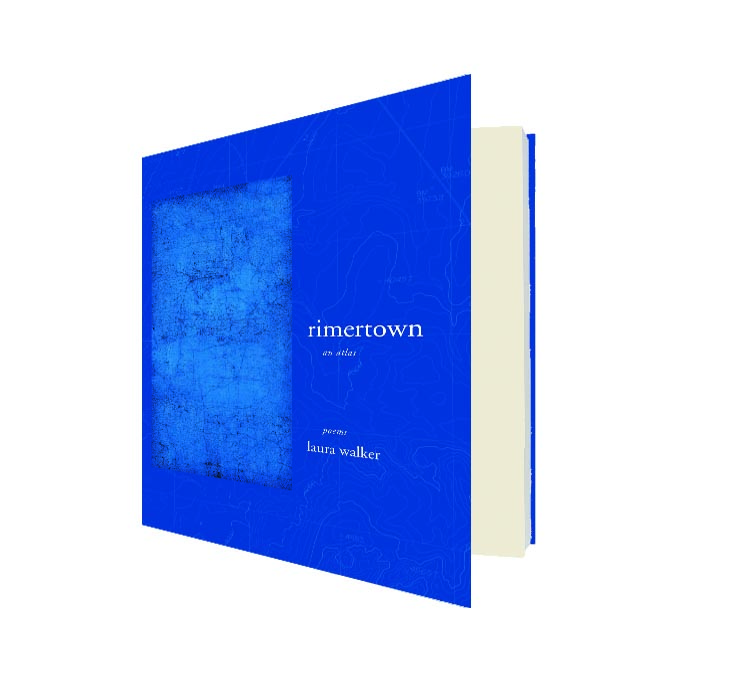Central question:
Are memories maps?
As a poet and a native of Rimertown, North Carolina, Laura Walker is uniquely poised at the intersection of two breakwaters—home as it is known, and home as it is created. Her second collection is at once, as its name suggests, a conspectus—an effort at charting the particularities of place and experience—and an interrogation of the language through which such places are known. It is an atlas of illustration, of landscapes interior and exterior, and an exploration of the lives lived there. As variegated as the landscapes it traces, Walker’s atlas consists of four forms in concert: “maps,” “stories,” vernacular prose poems, and a sparse, disjunctively reiterative narrative. These forms interact, whispering among themselves, repeating what they’ve heard, in much the same way we imagine the inhabitants of Rimertown speaking—in hushed tones and a language of their own.
Maps, as we might expect, dominate Walker’s atlas. Exclusively in verse, these “maps,” as they are titled (“map 27”, “map 81”), are views from above, topographic representations of life in Rimertown: “in the greening and the sound / girls in bright dresses, a wound that // taking us on the stairway // (shallow break on the northern side // (roots and thistles / who left rustling metal in a ditch // cows among ruins / side of a starling”. They are charts of scenic features, of relation—a self to landscape, landscape to itself—constructing the physical world, detailing contours of place and persons.
Walker’s “stories,” on the other hand, blend exteriority and interiority, verse and prose. If verse is the mode through which this atlas plots physicality, then prose serves personalization, where the “weight of denim and sleeves” is known. Scrutinizing the experience of dwelling within these landscapes, here the mappable coexists with the ephemeral—a change pocket becomes a “pocket for housing” and “lines of (fruit trees” become “lines of what you were dead for.”
If Walker’s maps and stories are the result of looking and looking more closely, her prose poems are records of listening, aural portraits taking Rimertown’s vernacular as inseparable from, even constitutive of, landscape. Where “there are spells and then there are spells,” only the finely tuned ear, awake to the private nuances of local language, can hope to catch the undercurrents of meaning and tacit mutual understanding.
Ultimately, though, it may be the elliptical narrative pieces, threaded through the atlas, that reveal both the mystery and the motivation of Walker’s project. Presented at the bottom of otherwise blank pages, these subtextual pieces work and rework their way through a series of moments that form the backdrop for the suicide of a wife and a mother. Here, the few luminous details these pieces provide—“elbows cold in flour,” “birds crumpled on the pier,” “whiskey bottles in piles”—become the essence, distilled into piercing notes, of lives in crisis. Where, Walker asks, is the intersection between the ordinariness of this woman who “got into the buick and tucked her purse under. headed out toward the lake” and the dark, radiant force of the same woman who “as she floated, pulled herself down”?
There is never a sense that Walker is attempting to answer the unanswerable, but in so deftly constructing a narrative addressing the incongruous and infinitely shifting crossroads of language, memory, and place, she has given readers the material through which to venture beyond the breakwaters, to seek answers for themselves.
Format: 86 pp., paperback; Size: 9″ x 8″; Price: $16.95; Publisher: University of California Press; Series: New California Poetry; Series editors: Calvin Bedient, Forrest Gander, Robert Hass, Brenda Hillman; Print run: 1,000; Book design: Claudia Smelser; Typeface: Garamond; Contents of the “Gossip” section of the Rimertown, NC, homepage: “There is no Rimertown, North Carolina, gossip yet”; Best patent-era medicine used to end a prose poem that begins with bergamot: Goody’s Powder; Representative line: “land drawn and drawn again, lines laid down in pencil and ink.”





